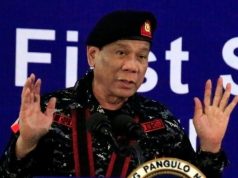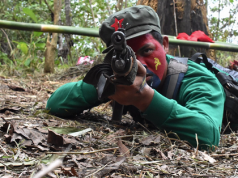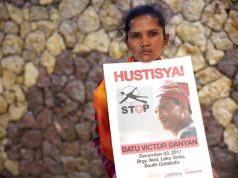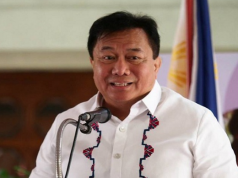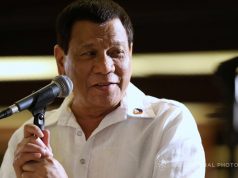(UPDATE 2 — 2:52 p.m.) MANILA, Philippines — Before taking their Christmas break, members of the Senate and the House of Representatives are likely to conduct a joint session to deliberate on President Rodrigo Duterte’s request to extend martial law in Mindanao.
In a text message to reporters on Monday, December 11, House Majority Leader Rodolfo Fariñas said that the congressional session “officially end on on Friday, Dec 15; hence, we may have a joint session on Thursday (Dec. 14) or Friday (Dec. 15) as part of the 2nd Regular Session, without need of a special session.”
He added that Congress members would have a briefing with military officials on Wednesday, December 13.
ML in Mindanao needed for ‘total eradication’ of ISIS-inspired and communist-led terrorist groups
In his five-page December 8 letter to Senate president Aquilino “Koko” Pimentel III and Speaker Pantaleon Alvarez, Duterte asked the chambers to extend martial law in Mindanao until 2018, “primarily to ensure total eradication” of terrorist groups in the region “inspired by of DAESH” or ISIS such as the Da’awatul Islamiyah Waliyatul Masriq (DIWM) and other local and foreign extremist groups and armed lawless groups “and the communist terrorists and their coddlers, supporters, and financiers.”
The President said his request for Congress to extend martial law in the South was based on the “security assessment made by” the Armed Forces of the Philippines (AFP) chief as stated in the December 4, 2017 letter that Duterte received from Department of National Defense chief Delfin Lorenzana.
“The security assessment submitted by the AFP, supported by a similar assessment by the Philippine National Police, highlights certain essential facts that I, as Commander-in-Chief of all armed forces of the Philippines, have personal knowledge of,” added Duterte.
Duterte: Terrorist acts by ISIS-inspired groups, NPAs continue
According to the chief executive, remnants of the DIWM and their allies, protectors, supporters and sympathizers “have been monitored in their continued efforts towards radicalization/recruitment, financial and logistical buildup, as well as in their consolidation/reorganization in Central Mindanao, particularly in the provinces of Maguindanao and North Cotabato and and also in Sulu and Basilan.”
“These activities are geared towards the conduct of intensified atrocities and armed public uprisings in support of their objective of establishing the foundation of a global Islamic caliphate and of a Wilayat not only in the Philippines but in the whole Southeast Asia,” the President noted.
Regarding the alleged threat by communists, Duterte informed Congress that while the government was preoccupied with fighting ISIS-inspired groups in the South, the New People’s Army allegedly “took advantage of the situation and intensified their decades-long rebellion.”
The NPA allegedly did this by stepping up “terrorist acts against innocent civilians and private entities, as well as guerilla warfare against the security sector and public and government infrastructure,” according to Duterte.
The President claimed that the NPA did all these “purposely to seize political power through violent means and supplant the country’s democratic form of government with Communist rule.”
Lagman: Where is actual invasion, rebellion in Mindanao?
But opposition lawmaker, Albay Rep. Edcel Lagman rejected Duterte’s request.
“Where is the actual invasion or actual rebellion in Mindanao? The Constitution provides that martial law can only be declared and its extension authorized in case of invasion or rebellion when public safety requires it,” Lagman said in a statement issued Monday.
He said another year of martial law in Mindanao would amount to the following:
1) Patent violation of the safeguards which the 1987 Constitution imposes for the limited grounds and duration of martial law and its extension;
2) Malevolent perpetuation of the subjugation of the supermajority in the Congress by the President even against the unequivocal provisions of the Constitution protecting civil liberties and the rule of law; and
3) Blatant mockery of the liberality of the majority of the Supreme Court in upholding the President’s past questionable actions
“Since the original or initiatory declaration of martial law is limited to not more than 60 days, it stands to reason that any extension is subject to the same constraints with respect to duration and grounds,” the lawmaker said.
“There is no more factual basis for the extension of martial law in Mindanao after President Duterte declared the liberation of Marawi City from rebels and terrorists almost two months ago, and government combat forces had been withdrawn,” added Lagman.
The Philippine National Police and the Armed Forces of the Philippines recommended the extension of martial law in Mindanao for another year purportedly to contain continuing threats by terrorists.
But Lagman said “this is not a constitutional ground because threat or imminent danger of an invasion or rebellion has been removed as a ground for martial law in the 1987 Constitution for being self-serving, contingent and even nebulous.”
“It is even arguable that not more than one extension is allowed because a series of extensions would violate the constitutional intent for a limited martial law duration, and the phraseology of the Constitution only authorizes the extension of “such proclamation” (original declaration), but not any extension thereof,” he explained.
Instead of extending martial law, Duterte should “call the armed forces to subdue lawless violence or declare martial law anew but limited by constitutional restraints and subject to the oversight powers of the Congress and the Supreme Court,” according to Lagman.




